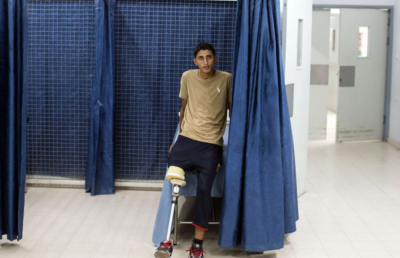New Catastrophic Plight in Gaza: Israel’s Attacks Leave More Than 5,000 Palestinians Disabled

All Global Research articles can be read in 51 languages by activating the Translate Website button below the author’s name (only available in desktop version).
To receive Global Research’s Daily Newsletter (selected articles), click here.
Click the share button above to email/forward this article to your friends and colleagues. Follow us on Instagram and Twitter and subscribe to our Telegram Channel. Feel free to repost and share widely Global Research articles.
***
More than 5,000 Palestinians have become disabled since 7 October due to Israel’s ongoing attacks on the Gaza Strip, Euro-Med Human Rights Monitor and the Disabilities Representative Persons Network (DRPN) said in a joint statement issued Thursday.
Israel’s air and artillery strikes and forced eviction policy have had catastrophic effects on people with disabilities in the Gaza Strip, including increased risk of death, difficulties evading attacks, and difficulties meeting basic needs.
The Euro-Med Monitor team’s preliminary statistics indicate that over 40,000 Gaza Strip residents have been injured during Israel’s attacks. The human rights group noted that at least 5,000 of these individuals have disabilities that put their lives in danger because of the dire lack of access to medical care and the collapse of the health system.
Significantly, prior to 7 October, over 130,000 people in the Gaza Strip were already disabled. The majority of these people suffered their disabling injuries during one or more of the frequent Israeli military operations on the Strip, which began more than 20 years ago. Due to Israel’s illegal blockade of Gaza since 2006, they endured extremely difficult living conditions due to a lack of assistive devices such as wheelchairs, crutches, and artificial limbs, as well as inadequate rehabilitation programmes.
According to Euro-Med Monitor and the DRPN, disabled people were subjected to numerous grave violations that affected different aspects of their rights, and their suffering has only intensified during the frequent ongoing Israeli attacks.
People with disabilities have distinct needs that remain unmet in the wake of Israel’s deadly attacks, posing a serious risk to their lives and exacerbating their suffering by contributing to the decline of their physical and mental health.
People with mobility impairments—especially those who have lower limb paralysis—struggle the most, because they depend on medical supplies on a daily basis to perform even the most basic tasks.
Those with disabilities including quadriplegia and muscular dystrophy require electricity to operate respiratory devices, clinical air mattresses, and food grinding devices for clinical nutrition. These needs cannot be met, however, as Israel has been cutting off fuel and electricity supplies to the Strip.
Palestinians with various disabilities are unable to evacuate areas safely and quickly enough to save themselves in the wake of intense Israeli attacks. This is particularly true for those who are physically disabled and unable to move around on their own, as well as those who have mental, visual, or hearing impairments and are unable to hear or understand what is going on around them.
Power and Internet outages present additional difficulties for disabled people seeking to access important information that may help them determine where, when, and how to flee to a safe shelter, as everyone tries to survive on their own during the initial lead-up to and aftermath of a strike, leaving people with disabilities behind.
People with disabilities have also been compelled to abandon their adaptive homes and, like hundreds of thousands of Gaza Strip residents, seek refuge in overcrowded emergency shelters where supplies of food, water, and sanitary facilities are in short supply.
The shelter centres, which are primarily located in schools, are not physically suitable for individuals with disabilities, noted Euro-Med Monitor and DRPN. This exacerbates their everyday suffering in time of high psychological pressure, heightening disabled people’s anxiety and fear for their safety.
At the same time, Israeli attacks have targeted emergency warehouses set up as part of humanitarian response plans to serve as the designated headquarters of institutions serving the disabled. The majority of these warehouses have been destroyed, making it impossible to provide the services that disabled people desperately need.
Head of DRPN, Zarif Al-Ghurra, confirmed that the damage caused by Israel’s attacks on Gaza’s disabled population could be considered a war crime and falls under the category of grave violations of international humanitarian law, international human rights law, and the Convention on the Rights of Persons with Disabilities.
Al-Ghurra pointed out that the United Nations Convention on the Rights of Persons with Disabilities, which Israel ratified in 2012, states that
“States Parties shall take, in accordance with their obligations under international law, including international humanitarian law and international human rights law, all necessary measures to ensure the protection and safety of persons with disabilities in situations of risk, including situations of armed conflict.”
In addition, UN Security Council Resolution No. 2475 emphasises that all parties to the armed conflict must take action to safeguard disabled civilians, plus enable the facilitation of humanitarian aid for everyone in need and ensure they receive it in a timely, safe, and unimpeded manner.
Euro-Med Human Rights Monitor and the Disabilities Representative Persons Network stressed that nothing is more urgent than an immediate and comprehensive ceasefire in the Gaza Strip to ensure the protection and safety of civilians, including persons with disabilities. The groups concluded that the international community must act now to ensure Israel’s compliance with legal obligations and prevent further suffering that may amount to discrimination on the basis of disability.
*
Note to readers: Please click the share button above. Follow us on Instagram and Twitter and subscribe to our Telegram Channel. Feel free to repost and share widely Global Research articles.
Featured image is from EMHRM

